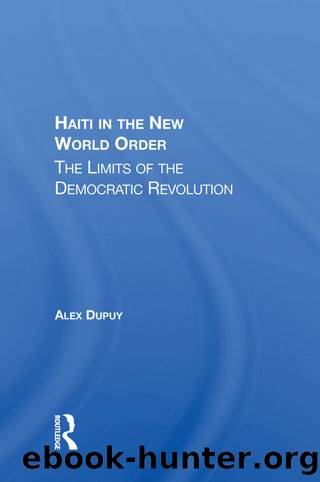Haiti in the New World Order: The Limits of the Democratic Revolution by Alex Dupuy

Author:Alex Dupuy [Dupuy, Alex]
Language: eng
Format: epub
Tags: History, Political Science, General, Latin America
ISBN: 9780813321134
Google: t2NqAAAAMAAJ
Goodreads: 1984607
Publisher: Westview Press
Published: 1996-12-09T00:00:00+00:00
Walking a Tightrope
At first glance, the Lavalas development model appeared to be very moderate and feasible because it remained compatible with the apparent interests of the Haitian bourgeoisie and would later win the approval of regulatory agencies in the core capitalist countries. One could go further and claim that the Lavalas development model would have strengthened the dominance of the Haitian bourgeoisie in the long run by creating a modern state dedicated to providing essential services to the population and improving the country's infrastructure. This, in turn, would have created more opportunities for investments and economic development led by the private sector. What, then, stood in the way of implementing the project? And why would Aristide be overthrown in September 1991 by the military, with the support of the bourgeoisie?
For a democratic system to survive, all the important contending political forces within the system must be convinced that it is in their interest to play by democratic rules. That is, the political forces must be assured that they can compete and that their interests and values have a fair chance of winning occasionally. They must also come to realize that, even when they lose, they are better off under a democratic regime than they would be under an undemocratic one (Przeworski, 1991:33). Haiti never had democratic regimes precisely because the most important political forcesâthe military, the prebendary state bourgeoisie, and the private sector bourgeoisieâalways believed they had more to gain under a dictatorship and more to lose under a democracy. The latter would inevitably have meant competition for public office and the right to rule legitimately. A democracy would also have raised issues of the effectiveness of government, public accountability, fairness, justice, and equalityâall or any one of which would have threatened the interests of the beneficiaries of the prebendary state system. Under such conditions, when powerful actors believe that they would be worse off under a democratic government and that there are no more powerful institutions or forces that could sanction their veto over the democratic process, the chances of democracy winning out over dictatorship are slim (Przeworski, 1991:26-33; Lipset, 1994:7-12).
It could be said that the likelihood of a successful transition to democracy in Haiti, even to a democratic government that would seek to preserve the interests of the powerful and propertied elites, was very remote. This was so if only because democracies, no matter how conservative and repressive they may be, are unpredictable: They may create opportunities for social forces that stand to benefit more from such a regime to advance their interests and challenge established privileges. Events from 1986 to 1990 made this point very clear to the privileged classes in Haiti as the popular forces seized on the slightest democratic openings to further their agenda, culminating with the election of Aristide in December 1990.
Aristide symbolized the worst fears of the prebendary state and the propertied bourgeoisie because he was not preaching a democracy that would protect the interests of all sectors of Haitian society equally. Rather,
Download
This site does not store any files on its server. We only index and link to content provided by other sites. Please contact the content providers to delete copyright contents if any and email us, we'll remove relevant links or contents immediately.
| Anarchism | Communism & Socialism |
| Conservatism & Liberalism | Democracy |
| Fascism | Libertarianism |
| Nationalism | Radicalism |
| Utopian |
The Secret History by Donna Tartt(19060)
The Social Justice Warrior Handbook by Lisa De Pasquale(12187)
Thirteen Reasons Why by Jay Asher(8895)
This Is How You Lose Her by Junot Diaz(6877)
Weapons of Math Destruction by Cathy O'Neil(6267)
Zero to One by Peter Thiel(5789)
Beartown by Fredrik Backman(5738)
The Myth of the Strong Leader by Archie Brown(5501)
The Fire Next Time by James Baldwin(5432)
How Democracies Die by Steven Levitsky & Daniel Ziblatt(5216)
Promise Me, Dad by Joe Biden(5146)
Stone's Rules by Roger Stone(5081)
A Higher Loyalty: Truth, Lies, and Leadership by James Comey(4955)
100 Deadly Skills by Clint Emerson(4921)
Rise and Kill First by Ronen Bergman(4780)
Secrecy World by Jake Bernstein(4743)
The David Icke Guide to the Global Conspiracy (and how to end it) by David Icke(4709)
The Farm by Tom Rob Smith(4502)
The Doomsday Machine by Daniel Ellsberg(4485)
